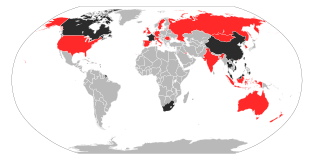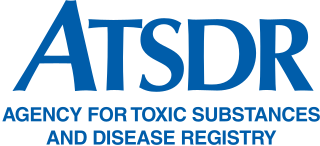Related Research Articles

The National Institutes of Health (NIH) is the primary agency of the United States government responsible for biomedical and public health research. It was founded in the late 1880s and is now part of the United States Department of Health and Human Services. The majority of NIH facilities are located in Bethesda, Maryland. The NIH conducts its own scientific research through its Intramural Research Program (IRP) and provides major biomedical research funding to non-NIH research facilities through its Extramural Research Program.

Severe acute respiratory syndrome (SARS) is a viral respiratory disease of zoonotic origin caused by severe acute respiratory syndrome coronavirus, the first-identified strain of the SARS coronavirus species severe acute respiratory syndrome-related coronavirus (SARSr-CoV). The syndrome caused the 2002–2004 SARS outbreak. In late 2017, Chinese scientists traced the virus through the intermediary of Asian palm civets to cave-dwelling horseshoe bats in Yunnan.

The 2002–2004 SARS outbreak was an epidemic involving severe acute respiratory syndrome (SARS) caused by severe acute respiratory syndrome coronavirus. The outbreak was first identified in Foshan, Guangdong, China, on 16 November 2002.

The Agency for Toxic Substances and Disease Registry (ATSDR) is a federal public health agency within the United States Department of Health and Human Services. The agency focuses on minimizing human health risks associated with exposure to hazardous substances. It works closely with other federal, state, and local agencies; tribal governments; local communities; and healthcare providers. Its mission is to "Serve the public through responsive public health actions to promote healthy and safe environments and prevent harmful exposures." ATSDR was created as an advisory, nonregulatory agency by the Superfund legislation and was formally organized in 1985.

Terry Duguid is a Canadian politician and executive in Manitoba, Canada, and is currently the MP for Winnipeg South in the House of Commons of Canada. He has campaigned for elected office at the municipal, provincial and federal levels, and served as a city councillor in Winnipeg from 1989 to 1995. He is the son of two time world and Canada curling champion Don Duguid.
The Public Health Agency of Canada is an agency of the Government of Canada that is responsible for public health, emergency preparedness and response, and infectious and chronic disease control and prevention.
Chief Public Health Officer (CPHO) is the title of the senior Canadian government official on matters related to the health and safety of Canadians. The post is held by a health professional who acts as the head of the Public Health Agency of Canada, which was established in 2004 amidst the SARS crisis.
Christopher David Naylor, is a Canadian physician, medical researcher and former president of the University of Toronto. He is ICES scientist emeritus and founding CEO. In 2016, he was inducted into the Canadian Medical Hall of Fame.

The Canadian Institutes of Health Research is the major federal agency responsible for funding health and medical research in Canada. It is the successor to the Medical Research Council of Canada. It aims to create new health knowledge and to translate that knowledge from the research setting into real world applications.

Mackenzie Richmond Hill Hospital is a hospital in Richmond Hill, Ontario, Canada and one of three in York Regional Municipality. Mackenzie Health in Richmond Hill is part of the Local Health Integration Network (LHIN) Hospital Partnerships.
Under United States law, Biological select agents or toxins (BSATs) — or simply select agents for short — are bio-agents which have been declared by the U.S. Department of Health and Human Services (HHS) or by the U.S. Department of Agriculture (USDA) to have the "potential to pose a severe threat to public health and safety". The agents are divided into (1) HHS select agents and toxins affecting humans; (2) USDA select agents and toxins affecting agriculture; and (3) overlap select agents and toxins affecting both.
Sheela Basrur, was a Canadian physician and Ontario Chief Medical Officer of Health and Assistant Deputy Minister of Public Health. She resigned from these positions late in 2006 to undergo treatment for cancer.

The Centre for Health Protection is an agency under the Department of Health in Hong Kong responsible for disease prevention and control. CHP plays the same role and function as the Centers for Disease Control in the United States, and the European Centre for Disease Prevention and Control in the European Union (EU).

The 2009 swine flu pandemic in Canada was part of an epidemic in 2009 of a new strain of influenza A virus subtype H1N1 causing what has been commonly called swine flu. In Canada, roughly 10% of the populace has been infected with the virus, with 428 confirmed deaths ; non-fatal individual cases are for the most part no longer being recorded. About 40% of Canadians have been immunized against H1N1 since a national vaccination campaign began in October, with Canada among the countries in the world leading in the percentage of the population that has been vaccinated. The widespread effect of H1N1 in Canada raised concerns during the months leading to the XXI Olympic Winter Games, which took place in Vancouver on February 2010.

Mel Krajden, M.D., is a professor of Pathology and Laboratory Medicine at the University of British Columbia in Vancouver, British Columbia, Canada. Dr. Krajden obtained his BSc, MD, and FRCPC at McGill University followed by a fellowship in Infectious Diseases at Stanford University. He is also the Medical Director of the Public Health Laboratory at the British Columbia Centre for Disease Control. His research focuses on the prevention and care of hepatitis, human papillomavirus, and human immunodeficiency virus.
Biosecurity in Australia is governed and administered by two federal government departments, the Department of Health and the Department of Agriculture, Water and the Environment. The Biosecurity Act 2015 and related legislation is administered by the two departments. The Act aims to manage biosecurity risks to human health, agriculture, native flora and fauna and the environment. It also covers Australia's international rights and obligations, and lists specific diseases which are contagious and capable of causing severe harm to human health. Each state and territory has additional legislation and protocols to cover biosecurity in their jurisdiction, and must liaise with the federal government in times of national emergency.

Zhong Nanshan is a Chinese pulmonologist. He was president of the Chinese Medical Association from 2005 to 2009 and is currently the editor-in-chief of the Journal of Thoracic Disease.

Theresa Tam is a Canadian physician and public servant who currently serves as the 3rd chief public health officer of Canada —initially acting in the role following the retirement of her predecessor, Gregory Taylor, on December 16, 2016—she was formally appointed on June 26, 2017.

Bonnie Henry MD MPH FRCPC is a Canadian physician who is the Provincial Health Officer for British Columbia, the first woman in this position. Henry is also an associate professor at the University of British Columbia. She has a background in epidemiology and is a specialist in public health and preventive medicine. Her handling of the COVID-19 pandemic in British Columbia earned praise in a dedicated New York Times article that called her "one of the most effective public health officials in the world".
Various Special Advisory Committees (SAC) are formed on an ad-hoc basis in Canadian government circles, especially public health as governed by the Public Health Agency of Canada.
References
- ↑ "National Advisory Committee on SARS and Public Health (Naylor) Report". PMID 15230164.Cite journal requires
|journal=(help) - ↑ "ARCHIVED: Learning from SARS: Renewal of public health in Canada – Report of the National Advisory Committee on SARS and Public Health". Public Health Agency of Canada. 24 September 2004.
- ↑ Duffin, Jacalyn (2006). SARS in Context: Memory, History, and Policy. McGill-Queen's Press. p. 171.
- ↑ "External Threats: Terrorism and Infectious Disease". Canadian Museum of History. Retrieved 22 May 2020.
- ↑ "Federal Report: Learning from SARS Renewal of Public Health in Canada". CBC. 7 October 2003.
- ↑ "SARS report slams governments". The Globe and Mail Inc. 7 October 2003.